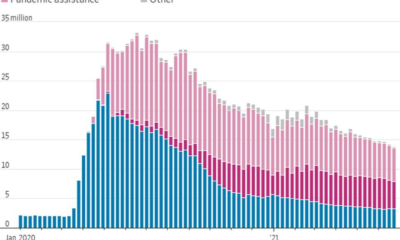Real Estate
Startups Are Looking To Fractionalize Real Estate Assets, But Should They? – Forbes

Startups are looking to fractionalize real estate assets to lower the barrier to entry in the … [+]
Investing in commercial real estate or vacation rental properties can be a consistent source of passive income and returns, not to mention growth and the potential liquidity you don’t get with owning your home. Yet the price of entry is often prohibitive to all but those who already have wealth. This was the puzzle Drew Sterrett wanted to solve in 2017, when he worked as an analyst at asset manager Tungsten Partners, focused on real estate. He spent all day looking at the potential investment returns as he poured over the numbers and helped the firm structure deals. He wanted in.
Sterrett believed he had the background needed to be successful. What he didn’t have was the capital required for a retail investor like him to get involved in the way he wanted. “Real estate is one of the largest wealth creators in the world, but it’s really been held off for the less than 1%, the 0.1% [of people], to invest side by side with institutional investors,” Sterrett tells Forbes One
If an asset was broken up, Sterrett realized, each tranche could be priced low enough to eliminate the financial hurdle, just like stock ownership. He cofounded LEX to do that. The New York-based startup acts as a securities broker to help existing owners of commercial buildings hold a public offering of shares for accredited and nonaccredited investors to buy and trade on LEX’s marketplace. “We are removing the cost of entry and many, or all, of the limitations,” he says. “We are now bringing [real estate investing] to the many and allowing them to gain access to a market they never thought they would be able to.”
LEX isn’t alone. The company joins a growing number of startups capitalizing on the concept of fractionalizing real estate assets. Each has its own strategy. Miami-based Here offers a marketplace of stakes into existing vacation rental properties. And Toronto-based Vesta Equity allows homeowners to tokenize and sell portions of their ownership as NFTs. Yet all claim the same mission of opening up the asset class to allow more access to its potential riches, and have the fees to create a great balance sheet. Market insiders and investors however, aren’t sure this strategy is the best idea for the market or the underlying users.
Clelia Warburg Peters, a longtime proptech investor and managing partner of Era Ventures questions whether the average investor is really prepared to tackle the nuances of the real estate asset class. She also wonders what problem these companies are really solving, as retail investors already have the ability to invest in real estate through real estate investment trusts (REITs) and many don’t. “The level of education in the public even around holding REITs is pretty low,” she tells Forbes. “This is literally exposure to a direct asset or a pooled vehicle of private assets, there is both education needed and risk.”
Market analysts, meanwhile, find this a dubious strategy in current market conditions. The pandemic-driven frenzy which drove up demand and lowered mortgage prices has started to cool, points out Gay Cororaton, a senior economist at the National Association of Realtors, who expects this to continue. If home ownership becomes more affordable, some potential customers may choose to purchase a full property, rather than invest in real estate assets. What’s more, fear around investors not knowing what to do may be overblown though, she adds. Mom and pop landlords maintain a lionshare of residential assets and many didn’t come to the industry with a real estate background.
On the commercial side, L.D. Salmanson, the CEO of real estate data and analytics startup Cherre, says it all depends on the asset. Warehouses and other industrial buildings including data centers have seen continued strong performance, he tells Forbes. But assets like retail and office buildings are just too up in the air right now to be a solid investment strategy. “Office is not doing well right now, it’s an open question whether that’s temporary or long term,” Salmanson says. “I can make the argument both ways.”
Yet the founders of both LEX and Here suggest their offerings aren’t any riskier than, say, downloading Robinhood and pouring money into stocks with no guidance, or backing early-stage startups on crowdfunding sites. Plus, the users of these startups aren’t stuck with the physical asset at the end of the day.
Here looks to avoid some of the risk by performing robust due diligence on the investment options on its platform, founder Corey Ashton Walters tells Forbes. While future performance isn’t guaranteed, the startup lists only existing vacation rentals that already produce 10% to 20% yearly booking yields. “We want to keep the wheels on the bus,” he says. “If an asset is doing well, they will continue to do well. Instead of one owner, there are hundreds of owners.” All assets on LEX were already producing a stable cash flow, according to Sterrett.
There’s also definitely a demand. When LEX officially launched in November, it had 10,000 potential members on its waiting list. And commercial property landlords are showing strong interest in working with the platform, too. Here launches this week with more than 20,000 members waiting to invest. Vesta Equity, currently only available only to accredited investors, plans to open its platform to nonaccredited investors within the next 12 months. Even before its February launch, Vesta Equity says it had hundreds on its waiting list and has since been approached by real estate developers interested in expanding Vesta’s offering as well.
All three real estate investing startups offer a new slate of options to the market. For LEX and Here, it’s opening a new avenue for retail investors looking to differentiate their assets. For Vesta Equity, cofounder Michael Carpentier says that the tokenized platform doesn’t just provide a new opportunity for investors, it gives homeowners a new strategy to gain liquidity without having to move.
“Imagine if you had $100,000 of cash in your wallet, nice you’ve got that, but you can’t use it, you have to borrow against it,” he says about the current system.
While all these startups have users and venture backers, it’s too early to see if their mission statements outweigh the risks.
Real Estate
Central banks end crisis-fighting measure as bank tumult recedes

Last month, the collapse of Silicon Valley Bank, the second-largest bank failure in US history, unleashed broader panic and raised fears the global financial system would seize up. Now, central banks are signaling that their immediate concerns have eased.
The Bank of England, the Bank of Japan, the European Central Bank and the Swiss National Bank said Tuesday that they would end daily measures to boost the flow of US dollars to lenders around the world. They cited “improvements in US dollar funding conditions” and “low demand” at recent operations aimed at providing liquidity.
Starting May 1, those operations will once again be held weekly, a decision made in consultation with the US Federal Reserve, the primary source of dollars. The frequency could increase again if needed, the four central banks said.
“These central banks stand ready to readjust the provision of US dollar liquidity as warranted by market conditions,” they said in their statements.
Policymakers sprung into action in March after the collapse of Silicon Valley Bank and Signature Bank in the United States sparked an acute bout of turmoil in the global banking sector. The tumult also nearly took down Credit Suisse (CS), a globally important but troubled bank, forcing Swiss authorities to arrange an emergency sale to rival UBS (UBS).
Hours after the Credit Suisse takeover was announced, the Fed said it would work with central banks in the United Kingdom, Japan, Canada, Switzerland and the European Union to make sure lenders there had access to the dollar liquidity they needed.
That meant making greater use of dollar swap lines, or agreements between the Fed and other central banks to provide dollars in exchange for, say, euros or yen.
Swap lines are a key instrument in central banks’ toolbox aimed at preserving financial stability and keeping credit flowing to households and businesses.
Real Estate
Fukushima’s fishing industry survived a nuclear disaster. 12 years on, it fears Tokyo’s next move may finish it off

It is still morning when Kinzaburo Shiga, 77, returns to Onahama port after catching a trawler full of fish off Japan’s eastern coast.
But the third-generation fisherman won’t head straight to market. First, he’ll test his catch for radiation.
It’s a ritual he’s repeated for more than a decade since a devastating earthquake and tsunami triggered a nuclear meltdown at the Fukushima Daiichi power plant in 2011, spewing deadly radioactive particles into the surrounding area.
Radiation from the damaged nuclear plant leaked into the sea, prompting authorities to suspend fishing operations off the coast of three prefectures that had previously provided Japan with half of its catch.
That ban lasted over a year, and even after it was lifted, Fukushima-based fishermen like Shiga were for years mostly limited to collecting samples for radioactivity tests on behalf of the state-owned electricity firm Tokyo Electric Power Company, or TEPCO, rather than taking their catches to market.
Ocean currents have since dispersed the contaminated water enough that radioactive cesium is nearly undetectable in fish from Fukushima prefecture. Japan lifted its last remaining restrictions on fish from the area in 2021, and most countries have eased import restrictions.
Shiga and others in the industry thought they’d put the nightmare of the past years behind them.
So when Japan followed through on plans to gradually release more than 1 million metric tons of filtered wastewater into the Pacific Ocean from the summer of 2023 – an action the government says is necessary to decommission the plant safely – the industry reeled.
The Japanese government and the International Atomic Energy Agency (IAEA), a United Nations body promoting the peaceful use of nuclear energy, say the controlled release, which is expected to take decades, will meet international safety regulations and not harm the environment, as the water will be treated to remove radioactive elements – with the exception of tritium – and diluted more than 100 times.
But with the deadline for the planned water release looming this summer, Fukushima’s fishermen fear that – whether the release is safe or not – the move will undermine consumer confidence in their catches and once again threaten the way of life they have fought so hard to recover.
Real Estate
Video shows US police at wrong house before shooting homeowner

Robert Dotson, 52, was killed by police on April 5 in New Mexico after officers responding to a domestic violence report arrived at the wrong house.
New Mexico police officers realised they were at the wrong address just moments before the front door opened and they fatally shot the armed homeowner, then exchanged gunfire with his wife, according to newly released body camera video of the April 5 shooting.
Robert Dotson, 52, was killed in Farmington, a city of 47,000 people in the southwestern US state, after officers on their way to a domestic violence call went to the wrong house.
The Farmington Police Department released several videos on Friday, including footage captured by body cameras worn by the three officers who fired their weapons.
“All of us – the men and women of the Farmington Police Department – recognise the severity of this incident,” Police Chief Steven Hebbe said in a statement.
“Once again, we wish to express our condolences to the Dotson family, and as your chief of police, I wish to convey how very sorry I am that this tragedy occurred,” Hebbe said.
-

 Business3 years ago
Business3 years agoHyundai Leads Industry in U.S. News & World Report 2023 Best Cars for the Money Awards
-

 Innovation3 years ago
Innovation3 years agoJay-S ventures into the urban genre with “Bailar en la Playa” his latest production
-

 Business3 years ago
Business3 years agoThree Questions Small Business Owners Should Ask In Creating A Workplace Culture – Forbes
-

 Business3 years ago
Business3 years agoA Fintech Makes It Easy For Small Businesses To Offer 401(k) Retirement Benefits – Forbes
-

 Business3 years ago
Business3 years agoBritain’s Small Businesses See Better Times Ahead But Is Their Optimism Justified? – Forbes
-

 Money3 years ago
Money3 years agoCharlie Crist leads Democratic gubernatorial field again in money chase – Florida Politics
-

 Money3 years ago
Money3 years agoTesting New Tools for Horizon Worlds Creators To Earn Money
-

 Business3 years ago
Business3 years agoSmall Business Labor Shortage – Forbes
